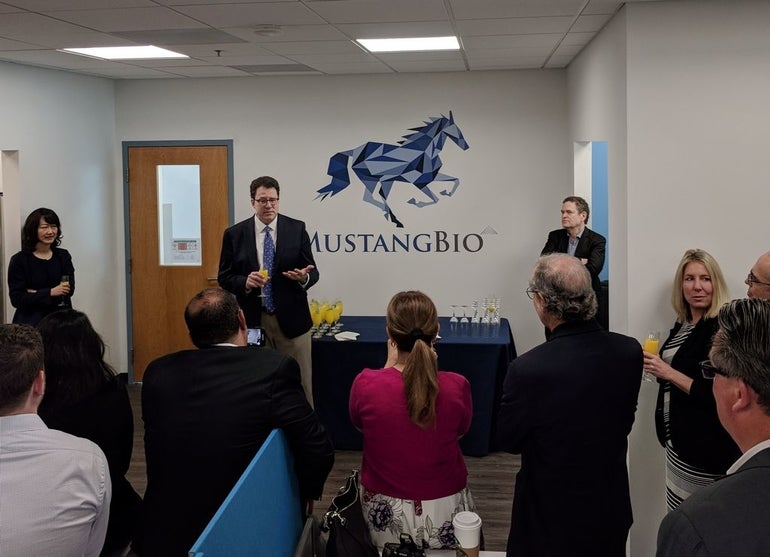A pharmaceutical company that modifies blood cells to help fight cancer marked the opening of its Worcester laboratories Friday.
Mustang Bio hopes to begin creating personalized immunotherapy in the labs before the end of the year using a process called chimeric antigen receptor engineered T-cell, or CAR-T, technology.
“Our goal with this facility will be that patients are alive because of this,” said Knut Niss, Mustang Bio’s chief technology officer.
The New York-based company is opening 14,000 square feet of space, with an eventual capacity of 27,000 square feet at the UMass Medicine Science Park.
Niss said Mustang Bio was attracted to Worcester for its available infrastructure with the science park and affordability compared to areas such as Boston or Cambridge. He said the company looked at roughly 30 sites across greater Boston before landing on the Worcester location.
The company first announced its lease at 377 Plantation St. last fall. The facility cost under $10 million, according to the company.
Kevin O’Sullivan, the president of Massachusetts Biomedical Initiatives, called Mustang Bio’s arrival, based on the company’s own initiative, a positive sign for Worcester’s medical and technology industries. Mustang Bio’s opening came the same month that the Chinese company WuXi Biologics said it will build a $60 million drug manufacturing facility off Plantation Street at the site of the former Worcester State Hospital.
The Mustang Bio facility is starting with roughly 20 employees who will conduct research and eventually use its four clean laboratories to create new T cells to help cancer patients.Patients will send blood to the facility, which will engineer millions of new T cells that are sent back to the patient and infused into their blood stream.
The T cells help fight a tumor in the same way that a person’s immune system helps fight off a fever. CAR-T technology is used in areas such as glioblastoma, an aggressive type of brain cancer, and acute myeloid leukemia, a cancer of the blood and bone marrow.
“It’s the only drug that exists that is self-replicating,” Niss said of the T cells’ abilities to quickly reproduce by the millions.
The CAR-T technology is relatively straightforward, Niss said, but with so much at stake, the process has to be done very carefully. The T-cell manufacturing process takes about seven days.
“If we fail here, (the patient) goes back empty-handed,” he said, “and that is not acceptable.”

